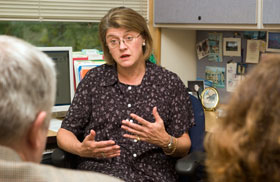  |
| HOME | THIS ISSUE | CALENDAR | PATENTS | BACK ISSUES | < BACK | NEXT > |
Health Center program supports families adopting troubled childrenby Pat Keefe - October 3, 2005 |
||||
|
Many of the children in the care of the state Department of Children and Families (DCF) have suffered child abuse or neglect, and have spent years in the welfare system. When they are adopted, they often arrive in their new homes with mental, behavioral, or health problems. Now, state and UConn officials have developed a way to provide much-needed early intervention and counseling in such cases. DCF and the Health Center have jointly announced that the services of the Health Center’s Employee Assistance Program – specifically, the Adoption Assistance Program (AAP) – are available to families who have adopted DCF children. “This program can enhance the experience of adopting,” says Elizabeth Robinson, manager of AAP. “It provides a mechanism of support that otherwise is not there. We want families to know they are not alone in this endeavor.” AAP is a confidential assessment, counseling, and referral service. It can address the emerging concerns of the adoptive family, officials say. The problems adoptive families face are numerous, and include childhood trauma, attachment issues, severely impaired functioning, emotional problems, loss issues and bereavement, eating disorders, reunification, and health issues. While other states have post-adoption programs, none are based on the Employee Assistance Program model. EAP began as a joint effort of labor and management to address the problems of troubled employees in the workplace. The main issues in the early days were alcoholism and absenteeism; the tools used are the ones used today: intervention, counseling, and where required, referral. Treatment benefited both employees and employers. The program was successful in reducing absenteeism, productivity improved, and trained and skilled workers remained on the payroll.
EAP grew to address not just workplace concerns, but workers’ personal or family issues. The success of the program was confirmed when other state agencies – the departments of Motor Vehicles, Administrative Services, and Banking, the Division of Public Defender Services, and others – contracted for the services of the Health Center EAP. Adoption brings a new dimension to EAP. While Health Center experts provide the core of the program, the plan calls for establishing affiliated offices around the state, bringing the services home to the adoptive families’ communities. The Farmington office will grow, too. An expert counselor in adoption issues will be hired to coordinate the program and outreach efforts. “We’re deeply moved by these families,” Robinson says. “Their commitment is awe-inspiring, and their devotion is unparalleled. If, in a small way, we can help ease their transition, our thanks will be in knowing there is a stable, loving family where once there was loneliness and upheaval.” |
| ADVANCE HOME UCONN HOME |

